| | | | | | | | | | | Axios World | | By Dave Lawler ·Jan 03, 2022 | | Welcome back to Axios World. - Happy 2022 to you all. I'm feeling refreshed after our holiday break.
- In tonight's edition (1,974 words, 7½ minutes) we'll get you back up to speed, cover China's "zero COVID" challenge and test your knowledge of cheese geography.
Please subscribe and tell a friend. | | | | | | 1 big thing: China's "zero COVID" challenge is getting harder | 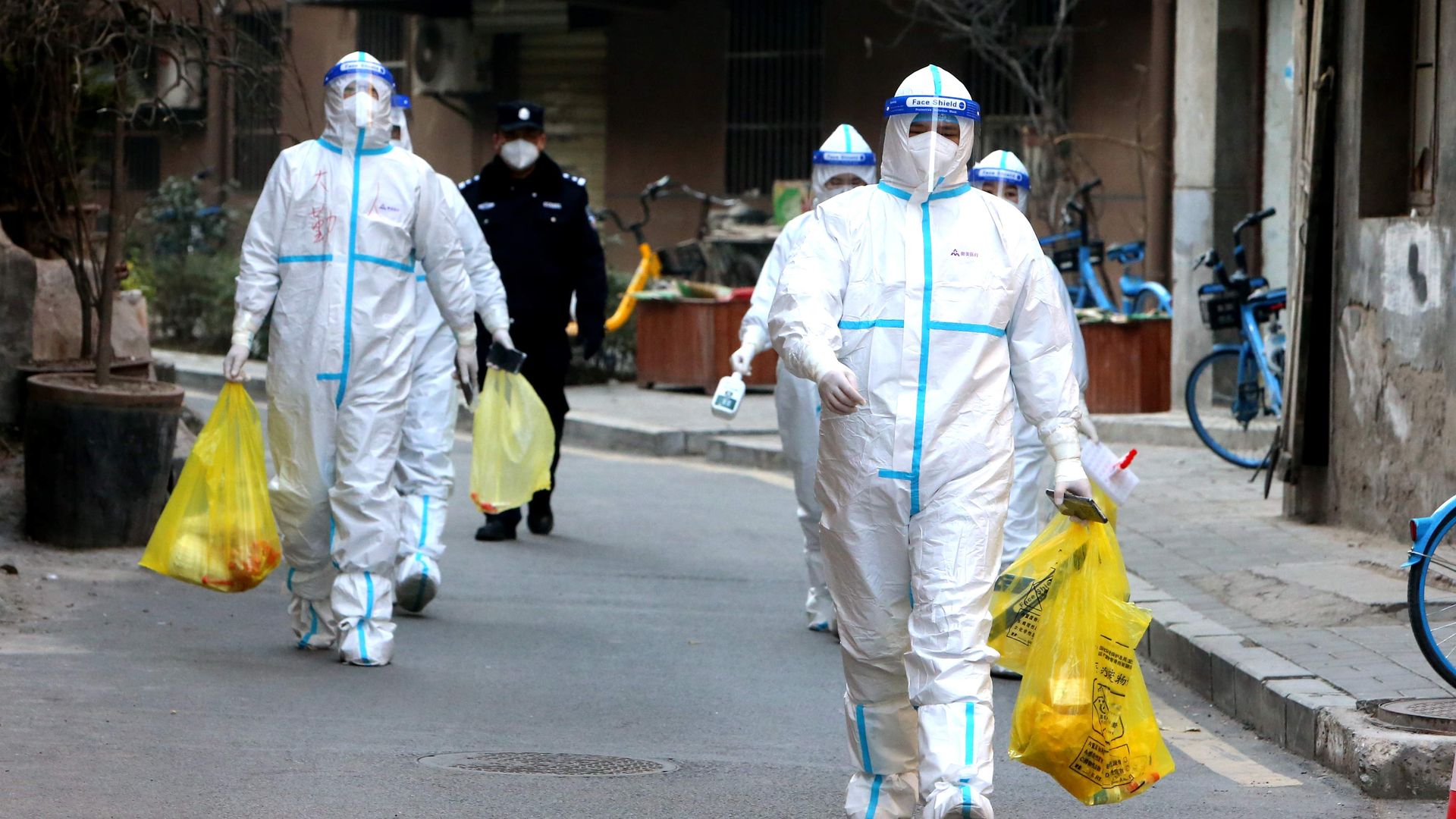 | | | Testing in Xi'an. Photo: VCG via Getty | | | | In New York City, 85,476 people tested positive for COVID-19 yesterday. In Xi'an, which has a larger population, that number was 122. But it's the central Chinese city that's currently living under the world's strictest lockdown. Why it matters: The Chinese government is going to drastic lengths to maintain its "zero COVID" policy even with more contagious variants like Omicron emerging and the rest of the world largely learning to live with the virus — including countries like Australia and New Zealand that had previously tried to keep all cases out. Driving the news: 12 days into a strict lockdown, residents of Xi'an are in most cases barred from leaving their homes, let alone the city, except for testing. - Cries for help have bubbled out from Xi'an on platforms like Weibo. Some residents say they haven't received enough to eat or any deliveries at all, per CNN. Residents of one housing compound were evacuated en masse just after midnight on Jan. 1 and forced into quarantine facilities, the BBC reports.
- "All we can do is add the shop owners' WeChats and sneak out at night. Buying food is like being a thief," one resident posted, per the FT. Local officials pledged Saturday to increase deliveries of free food and other essential goods.
- At least 26 officials have been punished in Xi'an for their handling of the outbreak, according to the Economist. Two COVID-prevention workers were detained after being captured on video beating a man who left home to purchase steamed buns.
The big picture: The zero COVID approach has in many ways been a massive success. Life has largely gone on as normal in China as hospitals filled and death tolls climbed in the West. - Over 80% of the population is vaccinated, and authorities have deployed mass testing at scale where necessary (over 6 million tests were conducted in Xi'an in one day last week).
Yes, but: The dismount will be very difficult. China has only recorded a few cases of Omicron thus far, but the strain will be hard to keep out and contain. The Winter Olympics, starting Feb. 4 in Beijing, will be one major test. - There is little immunity in the population, and China's domestic vaccines are less effective than the mRNA vaccines available in the West.
- A study in Hong Kong found that one of the primary Chinese vaccines, CoronaVac, does not prevent infection from Omicron even with a booster (it can still prevent hospitalization and death).
What to watch: The Eurasia Group consultancy placed China's zero COVID conundrum atop its annual list of global risks, released today. - The authors anticipate a cycle of infections, lockdowns, economic disruptions, state intervention and growing public dissatisfaction in 2022, with ripple effects for the global economy and the supply chain crisis.
|     | | | | | | 2. What you (may have) missed over the holidays | 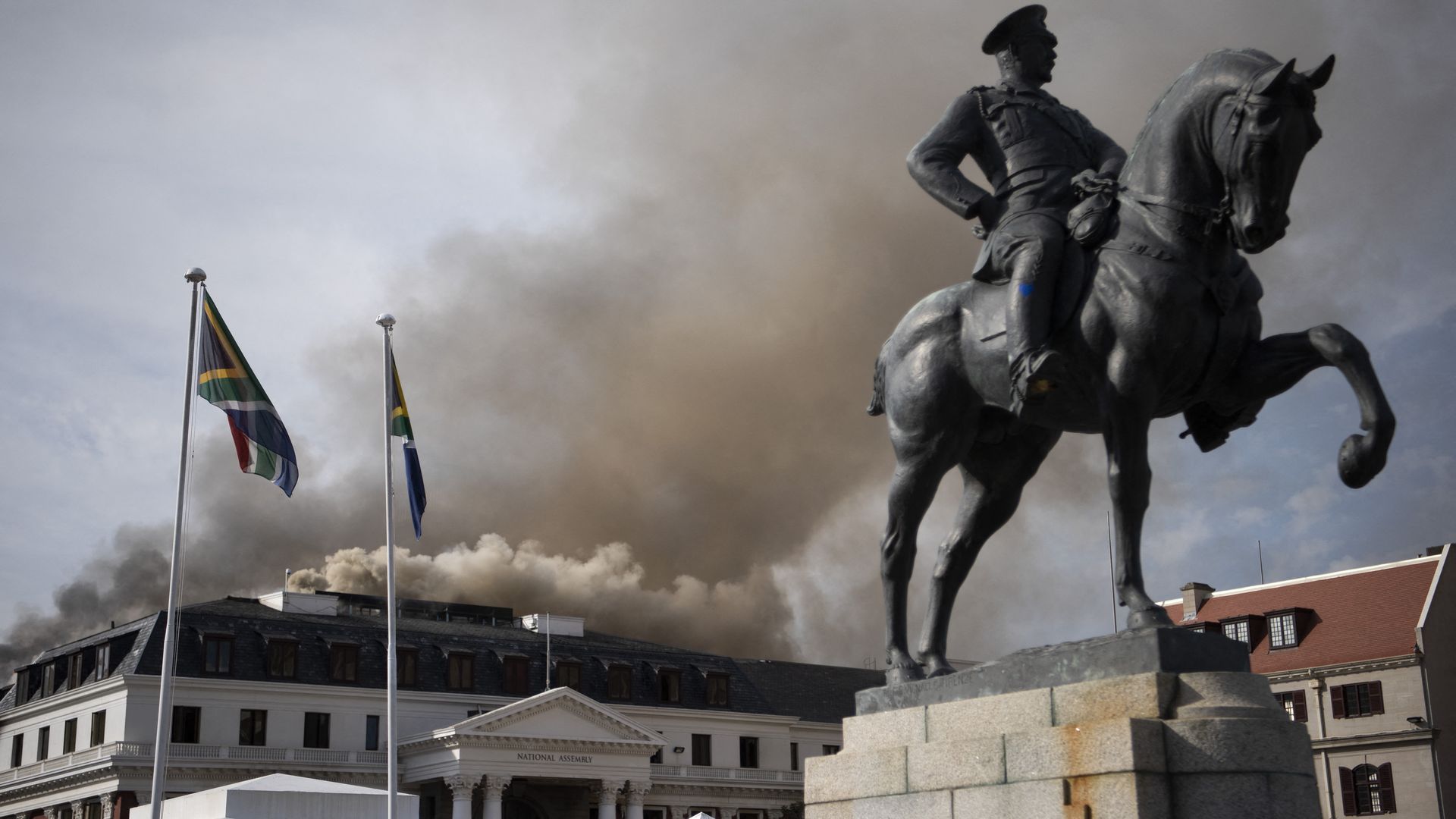 | | | Parliament on fire, in Cape Town, South Africa. Photo: Rodger Bosch/AFP via Getty | | | | 1. Evidence solidified that Omicron is more contagious but tends to produce less severe disease than Delta. - South Africa faced a huge surge in cases starting in November, but the government has already announced that the worst is over and started to lift restrictions.
- Responses were mixed. Paris mandated masks outside, while several countries reduced quarantine periods to cope with labor shortages. Even amid record cases, the U.K. government resisted new restrictions and Australia pushed ahead with reopening.
- Israel, meanwhile, became the first country to start rolling out fourth doses to people over 60. Expect more of that in other rich countries soon.
2. Russia's most prominent human rights organization, Memorial International, was ordered to shut down. - The group was founded in the late 1980s to shed light on Soviet-era crimes against humanity. Vladimir Putin prefers a more heroic vision of the Soviet past.
- Meanwhile, India barred a Christian charity founded by Mother Teresa from accepting foreign donations.
3. President Biden promised Ukrainian President Volodymyr Zelensky in a call Sunday that he would "respond decisively" if Russia invades Ukraine. 4. Somalia's president, known as "Farmaajo," tried to suspend the country's prime minister, who refused to step down. - The country's leaders already lack legitimacy. Farmaajo unilaterally extended his tenure last year after elections were delayed.
5. South Korean President Moon Jae-in unexpectedly pardoned his predecessor, Park Geun-hye, who had been jailed for corruption. 6. The Biden administration and the UN Security Council both took steps to make it easier to distribute humanitarian aid in Afghanistan, but the U.S. has kept the country's foreign reserves frozen. - With most aid stopped and overseas assets frozen, Afghanistan's cash crunch has rendered the economy hardly functional. The country faces perhaps the world's most dire humanitarian crisis in 2022.
7. The fire in South Africa's Parliament has resurged. The extent of the damage remains unclear. - A suspect will appear in court tomorrow on arson charges.
8. Italian lawmakers and regional officials will convene Tuesday to pick the country's next president in a secret-ballot process - The front-runner is the current caretaker prime minister and former European Central Bank chief, Mario Draghi. But if he takes up the mostly ceremonial seven-year term, it will leave a power vacuum and potentially force early elections.
- Former Prime Minister Silvio Berlusconi also wants a shot at the presidency.
|     | | | | | | 3. Sudan's PM steps down as army cracks down | 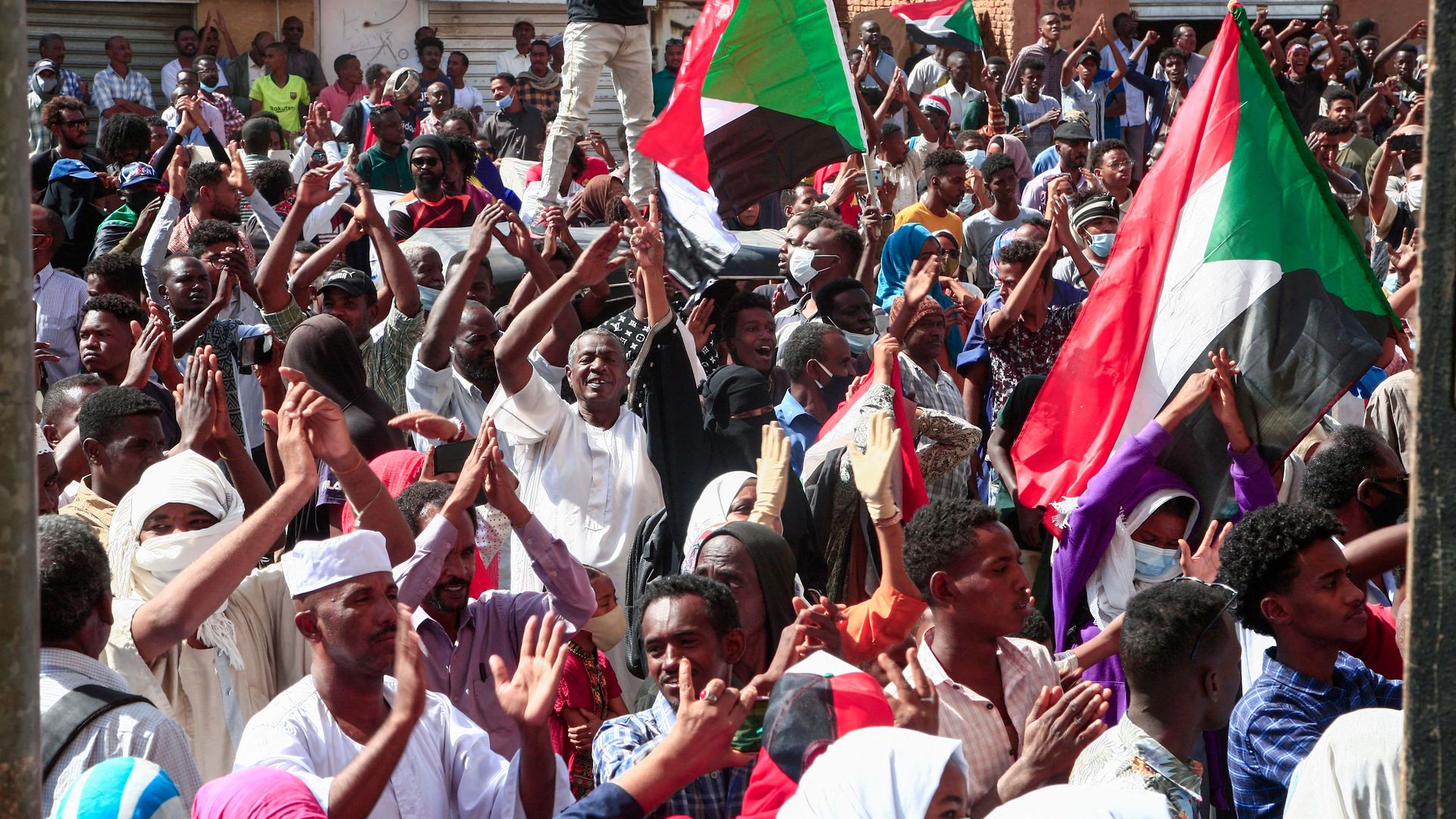 | | | A scene from Sunday's pro-democracy protests in Khartoum. Photo: AFP via Getty | | | | Sudanese Prime Minister Abdalla Hamdok resigned Sunday amid widespread pro-democracy protests that have rocked the country since a military coup in October, Axios' Laurin-Whitney Gottbrath writes. Why it matters: It's the latest blow to Sudan's fragile transition to democracy, which comes more than two years after an uprising led to the fall of dictator Omar al-Bashir. Catch up fast: Sudanese military leaders deposed Hamdok and placed him under house arrest in late October, prompting mass protests. - A power-sharing agreement was reached in November to reinstate Hamdok as prime minister, but the pro-democracy movement rejected the deal and protests continued.
- At least 57 people have been killed in the demonstrations since October, including three protesters killed earlier Sunday, according to the Central Committee of Sudan Doctors.
What they're saying: Hamdok said in a national address that it was time for "another man or woman of this noble country" to oversee the transition to democracy. - "I tried as much as I could to avoid our country from sliding into disaster. Now, our nation is going through a dangerous turning point that could threaten its survival unless it is urgently rectified," he said.
- The U.S. State Department released a statement calling on "Sudanese leaders" to "find consensus." That doesn't currently look particularly likely.
|     | | | | | | A message from Axios | | The podcast to power your day. | | |  | | | | Every weekday morning, host Niala Boodhoo catches you up quick on the latest news and interesting stories you won't hear anywhere else. In 10 minutes, you'll hear the latest in US and world news. Listen now for free. | | | | | | Bonus: Where in the world? |  | | | Screengrab via Apple Maps | | | | Thanks to reader Henry R. for suggesting today's topic: cheeses named for places. We'll be making stops in tiny villages (2, 4, 5, 8, 9), small cities (6, 10) and three regions, either current (1) or historic (3, 7). - To help you get your bearings, we're starting in Spain with stops in France (2–4, 8), the U.K. (5), the Netherlands (6), Belgium (7), Switzerland (9) and Italy (10).
- Can you name all 10 cheeses?
Scroll to the bottom for the answers. |     | | | | | | 4. View from Ankara: Inflation hits hard |  Source: FactSet; Chart: Axios Visuals ANKARA, Turkey — Turkey's year-on-year inflation rate jumped to 36% according to December's consumer price index (CPI), released Monday. That's the highest rate since 2002, Menekse Tokyay writes for Axios. The big picture: President Recep Tayyip Erdoğan has continued to push for cuts to interest rates amid soaring inflation, arguing it will strengthen Turkey's exports and the construction sector. But that unorthodox approach has seen prices fluctuate wildly and the purchasing power of working-class Turks decrease significantly. Many Turks have moved or joined their households to cope with spiking rents and utility bills, particularly in Istanbul, where around one-fifth of the population lives and where the cost of living has increased by 50% over the past year. - Photos of elderly Turks collecting vegetables discarded by vendors at marketplaces have become common. Street vendors have begun selling half bagels. In Ankara, philanthropists have helped to cover electricity and water bills.
- The earnings of ordinary Turks will further erode in the new year due to fresh hikes in electricity and gas prices on New Year's Eve.
- The government recently raised the minimum wage by 50%, but the new monthly wage is currently worth less relative to the dollar than the prior wage was at the beginning of last year.
Between the lines: The official statistics may not even tell the full story. The Turkish Statistical Institute's senior leaders have been repeatedly replaced, raising questions about the statistical body's political independence. Driving the news: Erdoğan announced a plan on Dec. 20 to reverse the trend of Turks putting their savings in foreign currencies like the dollar by guaranteeing local currency deposits, with the state covering any losses in value. - That policy could strain the budget and push inflation rates higher.
The state of play: According to a new poll, some 60% of Turkish citizens do not believe the economy will recover under the current government. That includes around one-third of the ruling party's voters. |     | | | | | | 5. What I'm reading: Raging against "man haters" in South Korea | 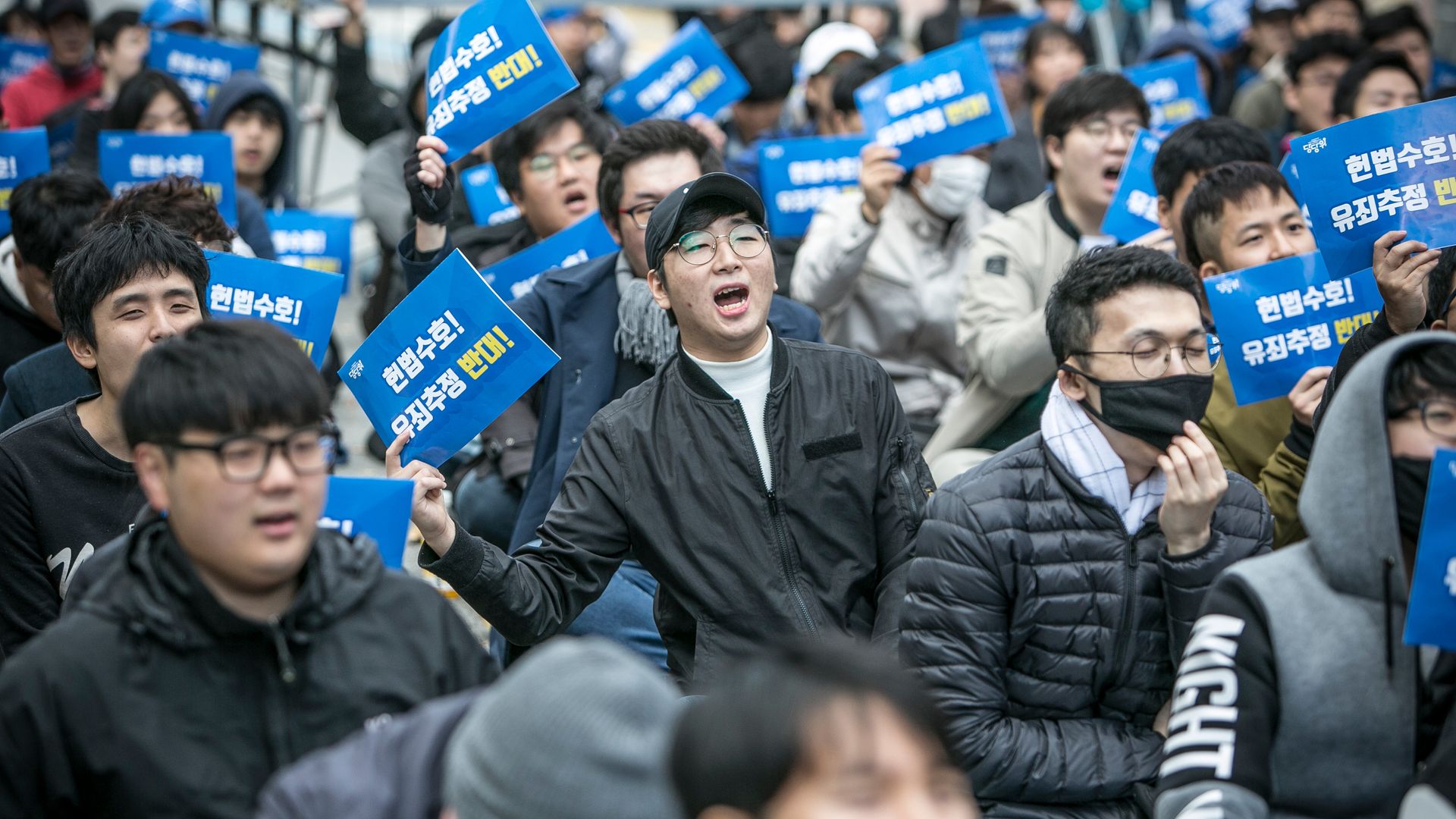 | | | An anti-MeToo protest in Seoul. Photo: Jean Chung/Getty Images | | | | There's a big, politically potent movement opposing gender discrimination in South Korea — against young men. The NYT's Choe Sang-Hun reports: - "South Korea has the highest gender wage gap among the wealthy countries. Less than one-fifth of its national lawmakers are women. Women make up only 5.2 percent of the board members of publicly listed businesses."
- "And yet, most young men in the country argue that it is men ... who feel threatened and marginalized. Among South Korean men in their 20s, nearly 79 percent said they were victims of serious gender discrimination, according to a poll in May."
Between the lines: Women now outnumber men at universities and compete with them in the job market. Anti-feminist groups argue compulsory military service puts men at a disadvantage. - "They have threatened businesses with boycotts, prompting companies to pull advertisements with the image of pinching fingers they said ridiculed the size of male genitalia."
- "The gender wars have infused the South Korean presidential race. ... With the virulent anti-feminist voice surging, no major candidate is speaking out for women's rights."
Dive in. |     | | | | | | 6. One to watch: The next North Korea crisis | 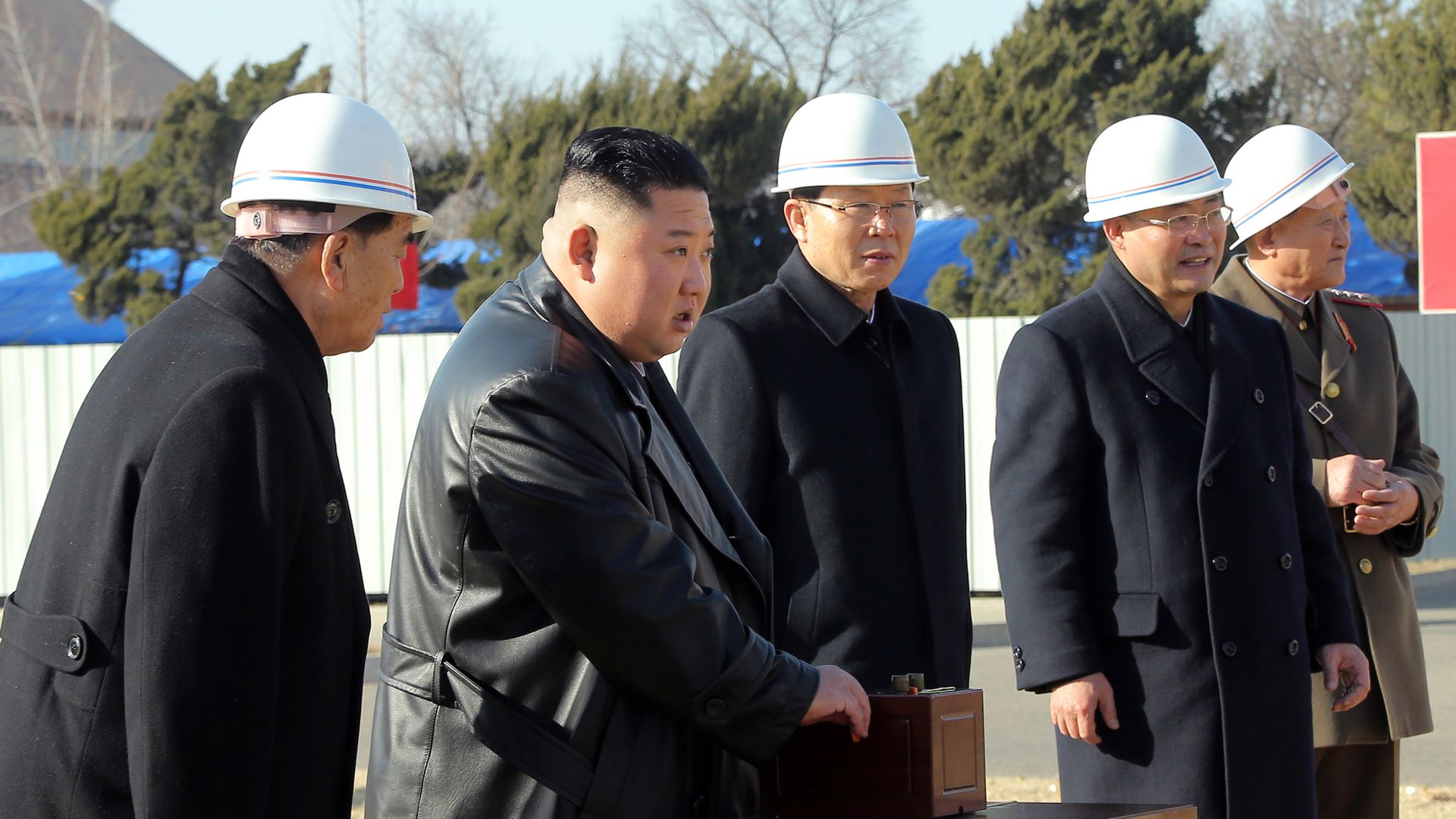 | | | Kim Jong-un with his finger near the button (at a demolition site in Pyongyang). Photo: API/Gamma-Rapho via Getty Images | | | | Kim Jong-un has remained relatively quiet during Joe Biden's presidency so far, keeping his threats and missile testing well below the "fire and fury" levels of the early Trump administration. Why it matters: Kim could force his way onto Biden's agenda in 2022 through a major provocation, a charm offensive or a combination of the two, potentially ahead of the South Korean election in March. State of play: Biden administration officials say they've proposed talks, but the North Koreans aren't engaging. - North Korea, meanwhile, conducted missile tests in 2021, but not on a level that rings global alarm bells. Kim has still yet to test a nuclear weapon or intercontinental ballistic missile since 2017, but he did show off advanced new missiles at a military parade last January.
- With Pyongyang spurning diplomacy but limiting its provocations, Biden has essentially been in wait-and-see mode.
What to watch: "We may have a February or March surprise before the South Korean election if Kim wants to increase the potential for a progressive president to succeed Moon," says Bruce Klingner, a senior fellow at the Heritage Foundation and formerly the CIA's deputy division chief for Korea. Go deeper |     | | | | | | 7. Stories we're watching | 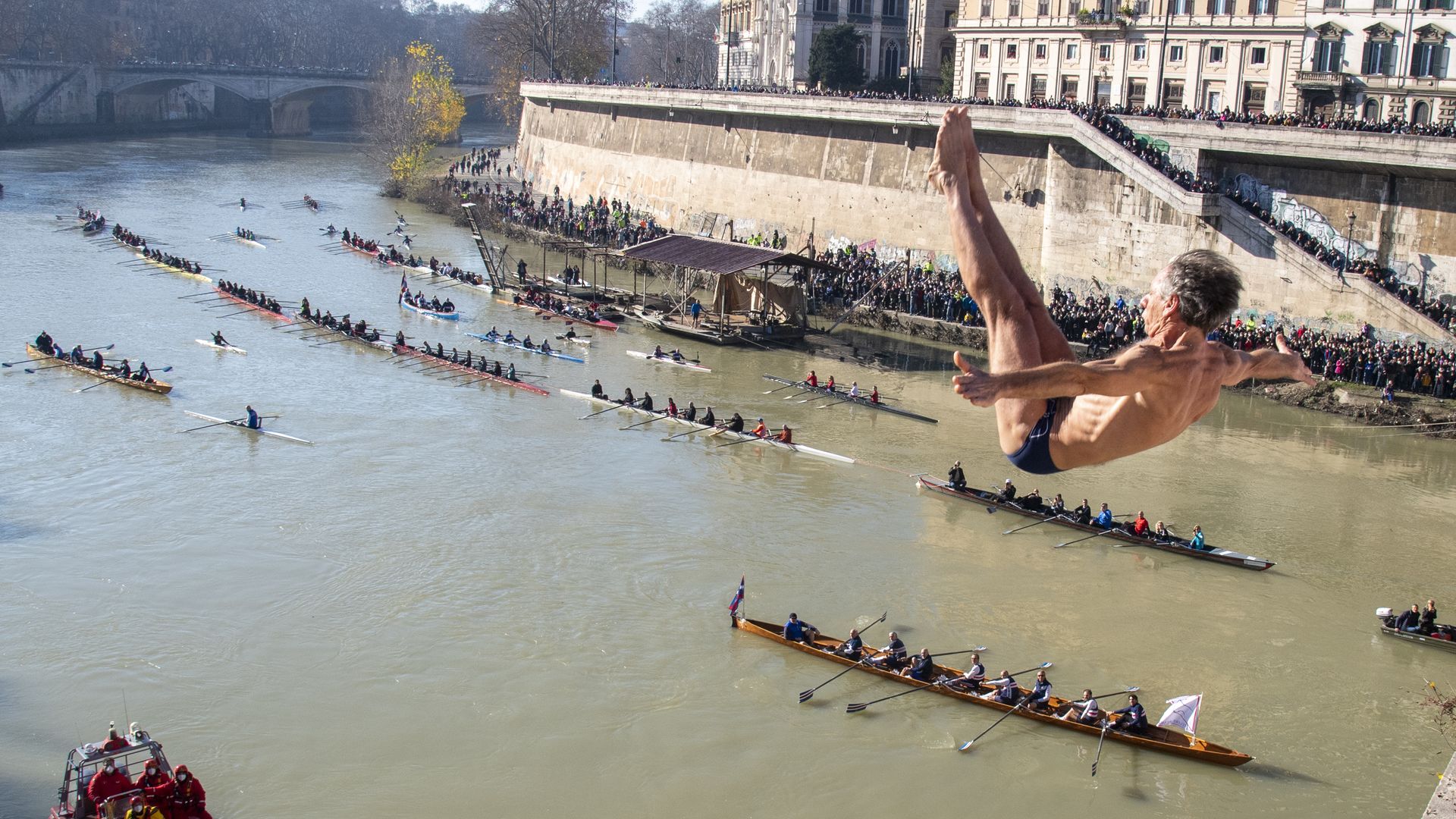 | | | A New Year's Day dive into the Tiber in Rome. Photo: Fabrizio Corradetti/SOPA Images/LightRocket via Getty | | | - Trump endorses Orbán
- Hong Kong media crackdown continues
- Aid workers among 30 killed in Myanmar massacre
- Why U.S. giants keep caving to China
- Harvard professor convicted of false statements on China ties
- Israeli minister hosts Palestinian president for rare meeting
- India expands vaccinations to teens, approves two new shots
- What Afghans face 4 months after evacuation
Quoted: "To break the stigmas and paradigms and make people recognize what was done. It is a recognition of the President of the Republic." — Outgoing Mayor Roberto Tellez Monroy of Atlacomulco, Mexico, on why he was unveiling a statue of President Andrés Manuel López Obrador in his city, an opposition stronghold. "The statue was demolished. It was an apparent act of vandalism." — The state prosecutor's office, two days later. |     | | | | | | A message from Axios | | The podcast to power your day. | | |  | | | | Every weekday morning, host Niala Boodhoo catches you up quick on the latest news and interesting stories you won't hear anywhere else. In 10 minutes, you'll hear the latest in US and world news. Listen now for free. | | | | Answers: 1. Manchego (La Mancha, Spain); 2. Roquefort (Roquefort-sur-Soulzon, France); 3. Brie (Brie, historic region of France); 4. Camembert (Camembert, France); 5. Cheddar (Cheddar, U.K.); 6. Gouda (Gouda, Netherlands); 7. Limburger (Limburg, historic duchy of Belgium); 8. Munster (Munster, France); 9. Gruyère (Gruyères, Switzerland); 10. Parmesan or Parmigiano Reggiano (Parma, Italy). |  | Bring the strength of Smart Brevity® to your team — more effective communications, powered by Axios HQ. | | | | | | Axios thanks our partners for supporting our newsletters. If you're interested in advertising, learn more here.
Sponsorship has no influence on editorial content. Axios, 3100 Clarendon Blvd, Suite 1300, Arlington VA 22201 | | | You received this email because you signed up for newsletters from Axios.
Change your preferences or unsubscribe here. | | | Was this email forwarded to you?
Sign up now to get Axios in your inbox. | | | | Follow Axios on social media:    | | | | | |
Post a Comment
0Comments